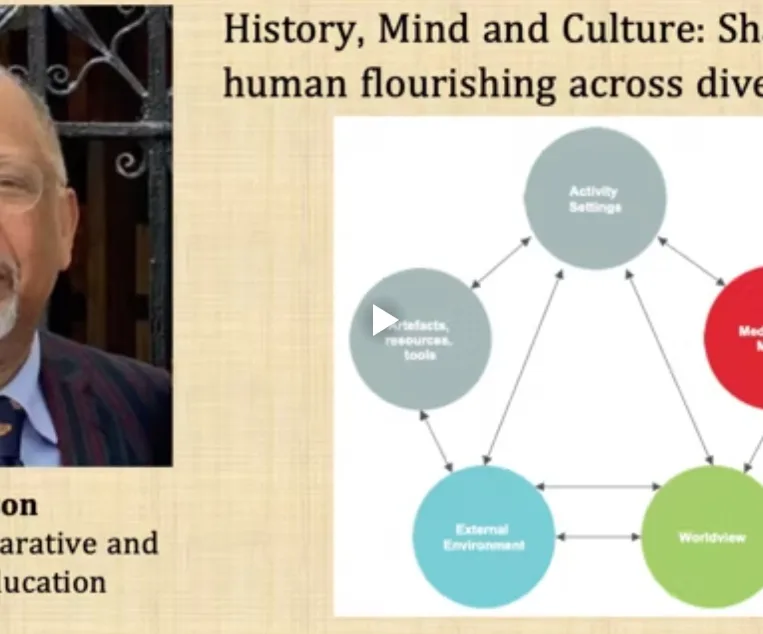Menu

This recording is the first in a series of public seminars given by Templeton World Charity Foundation (TWCF) grantees, lecturing at St Antony’s College, University of Oxford. These lectures are part of Education, Purpose and Human Flourishing in Uncertain Times (EPHF), a TWCF-supported three-year project that explores new understandings of education, purpose and human flourishing through annual convenes and publications.
Discussions that took place in the first year of the EPHF Project examined a variety of important concepts concerning personhood and society as it relates to flourishing, such as character and virtue, and asked whether flourishing lies in the development of these.
In EPHF's second year, attention is turned to other notions interdependently related to flourishing, specifically the notions of culture and context. The theme is Education and Human Flourishing: Culture and Context — the relationship between the desire to ‘become’ and cultural and contextual adversities. The series will explore how we might better understand the ‘idea’ or indeed the ideal of flourishing, and the importance of education as a pathway to it. Concepts such as motivation, grit, determination and capability will be looked at, and what different cultures and contexts can teach us about education and human flourishing amidst adversity will be contemplated.
In simple terms, year two of this series asks whether and how the development of mind and socio-emotional qualities such as character, virtue, open-mindedness, resilience, and actualization are differently, but no less meaningfully, shaped by history and culture across world contexts.
In this talk, Johnson discusses the importance of history and of understanding the historical trajectory of education in different contexts. Johnson emphasizes that "ultimately, it is in human activity that human beings flourish. But human activity isn't just activity — it's purposeful activity. We can't simply ask the question: What is the purpose of education and is it a driver for human flourishing? Externalities like culture and history, and certainly the different contexts in which education is given or not, and indeed the external forces that control and shape the type of education that has been and is still being given, is not often taken into account" in the sphere of flourishing science.
"Aristotle and others, talk of a good upbringing, of having been brought up being shown, if you like, pathways towards making important moral and good and right decisions, and empathy, and all the rest of it it. These are not necessarily goods," or external resources, observes Johnson. "We really need mediational means, a way in which those goods are turned into service." Flourishing can happen when those means are used and distributed in a way that is fair and equitable.
"If we're looking at education as a driver, and education as fulfilling its purpose to enable human flourishing, then we must look at how we resource education, and ultimately this comes down to those who control education," says Johnson.
How do people negotiate, mediate, and overcome strife and adversity? "Where the best learnings lie is at the confluence of troubled waters, where streams flow together," says Johnson. "My argument would be to understand the activity settings themselves, not necessarily their outcomes. This is not to say that people shouldn't strive for outcomes such as peace or health," but Johnson's point is to look at how we enable the activity setting as a unit of analysis for human flourishing. "How do we make activity settings meaningful and what kind of education do we need there in terms of mediational means?" asks Johnson. "Education itself is a mediational means, but only when it is properly mediated through culture, values, history and so on."
Stay tuned for the next video from this important exploratory series. We'll be posting them here at TWCF's Future of Flourishing blog each week.
Dr. David Johnson, Junior Proctor, University of Oxford, Reader in Comparative and International Education, and Fiona Gatty, DPhil., Research Project Coordinator and TWCF Fellow in Comparative Education, are Principal Investigator and Co-Investigator of the EPHF Project.